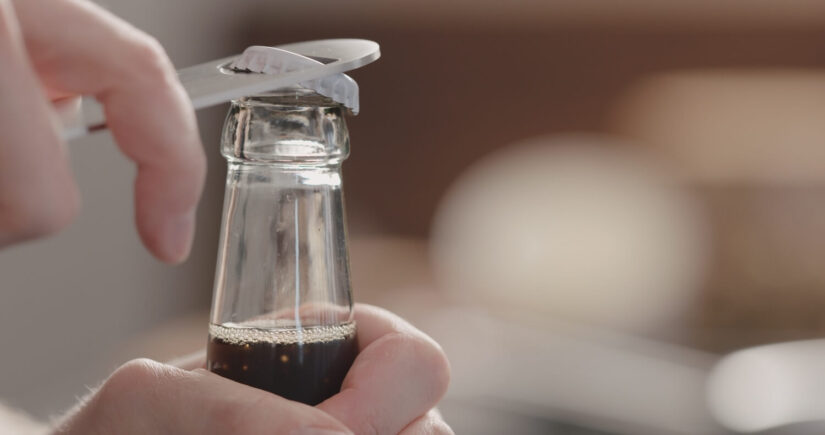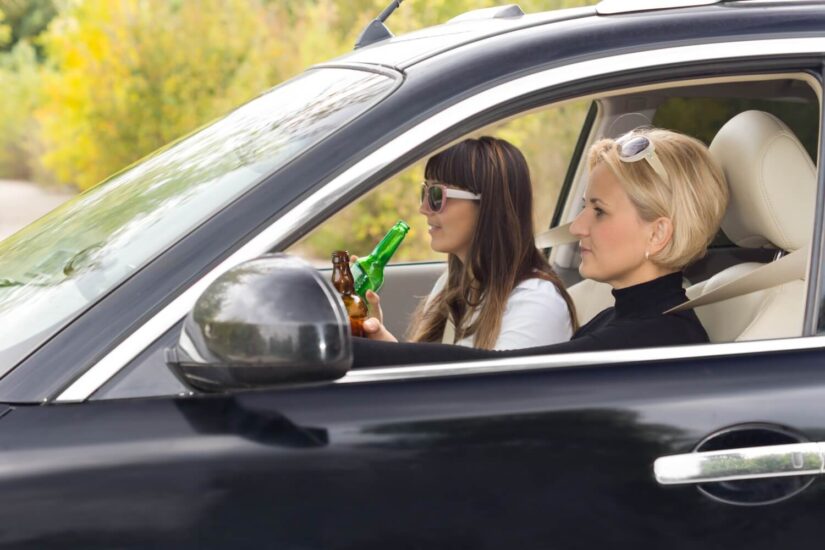
June 27, 2025
Breaking Texas’s Open Container Law can cost you up to $500 per violation—or more if paired with a DWI.Here’s what you need to know to stay compliant:
- What qualifies as an open container? Any alcohol container with a broken seal, even if resealed, counts. This includes bottles, cans, cups, or flasks.
- Where are open containers banned? The passenger area of vehicles on public highways. Exceptions include the trunk, locked glove compartments, or areas behind the last upright seat in vehicles without a trunk.
- Penalties: A Class C misdemeanor with fines up to $500. If combined with a DWI, penalties escalate to a Class B misdemeanor, with fines up to $2,000 and jail time.
- Avoid violations: Store open containers in the trunk or approved areas, and remember, ride-share vehicles like Uber and Lyft must follow these rules too.
Knowing these rules helps you avoid fines, protect your driving record, and make Texas roads safer.
What Counts as an Open Container
In Texas, understanding what qualifies as an open container is essential to avoid legal trouble. The laws are broad and cover more situations than you might expect.
Legal Definition and Requirements
Under Texas law, an open container refers to any bottle, can, or other container holding any amount of alcohol that has been opened, unsealed, or partially emptied.
This definition is strict. Once a seal is broken—even if you reseal the container—it remains legally open. For example, recorking a wine bottle or recapping a beer doesn’t change its status. The law also doesn’t differentiate based on how much alcohol remains. Whether the container is nearly full or holds just a few drops, it’s treated the same under Texas law.
Common Examples of Open Containers
The law applies to a wide variety of containers, not just the obvious ones like beer bottles or wine glasses. It includes anything capable of holding liquid, such as bottles, cans, cups, mugs, flasks, and thermoses.
Here are some specific examples:
- Beer and wine containers: A half-finished beer or a recorked wine bottle is considered an open container because the original seal has been broken.
- Cups and flasks: Alcohol in travel mugs, cups, or flasks also falls under the open container category.
- Hard liquor bottles: Once opened, these bottles remain classified as open, even if they appear full or have been recapped.
- Mixed drinks: Whether in a plastic cup, water bottle, or coffee mug, any container holding a mixed alcoholic beverage qualifies as open.
Empty containers are generally exempt. However, if a container looks empty but is cold to the touch or shows signs like condensation, law enforcement might consider it suspicious. To avoid any issues, it’s best to remove empty alcohol containers entirely from your vehicle’s passenger area.
The broad scope of these rules means that even containers you wouldn’t typically think of could lead to legal problems if they’re in the wrong place in your car.

Where Open Containers Are Not Allowed
Texas law lays out clear guidelines about where open containers are prohibited, focusing on the “passenger area” of a vehicle. Understanding this concept can help you steer clear of potential violations.
The Passenger Area Defined
The passenger area refers to the part of a vehicle designed for seating the driver and passengers. If an open container is accessible—like sitting in a cup holder or within arm’s reach—it likely qualifies as being in the passenger area. Under Texas law, open containers are not allowed in this area when the vehicle is on a public highway.
Exceptions to the Rule
There are specific areas in a vehicle where open containers are permitted. These include:
- The trunk of the vehicle
- A locked glove compartment
- The space behind the last upright seat in vehicles without a traditional trunk
Certain types of vehicles also have exceptions. For example, passengers in commercial vehicles like buses, taxis, and limousines can legally have open containers, though drivers must still comply with the prohibition. Similarly, in recreational vehicles (such as motor homes or campers), open containers are allowed in the living quarters but not in the driving area.
Additionally, in May 2021, Texas passed House Bill 1024, making to-go alcohol sales permanently legal. However, these beverages must be sealed by restaurants and bars to avoid violations.
To stay on the right side of the law, always store open containers in your trunk or another permitted area—or better yet, remove them entirely before hitting the road.
Penalties for Breaking the Texas Open Container Law
Violating Texas’ open container law comes with penalties that can extend beyond just fines, potentially impacting your insurance rates, job prospects, and even your driving privileges. It’s necessary to understand the seriousness of these consequences to avoid long-term repercussions.
Basic Penalties
In Texas, having an open container of alcohol in a vehicle is considered a Class C misdemeanor. This means you could face fines of up to $500 per container. Importantly, each open container is treated as a separate violation, so if you’re caught with three open cans of beer, you’re looking at fines that could total $1,500.
While there’s no jail time for an open container violation on its own, the offense stays on your record indefinitely, which can lead to higher car insurance premiums. Insurance companies often view individuals with such violations as higher risk, potentially leading to increased costs. The stakes become even higher if this violation is paired with a DWI charge.
Increased Penalties with DWI
If you’re caught with an open container while driving under the influence, the penalties ramp up significantly. In these cases, Texas law imposes a mandatory minimum of six days in jail, compared to the 72-hour minimum for a standard first-time DWI offense. The charge remains a Class B misdemeanor, with fines that can reach up to $2,000.
| Offense Type | Minimum Jail Time | Maximum Fine | Classification |
| DWI (Standard) | 72 hours | Up to $2,000 | Class B Misdemeanor |
| DWI with Open Container | 6 days | Up to $2,000 | Class B Misdemeanor |

Additionally, having an open container in the vehicle can serve as evidence of intoxication, potentially weakening your defense options if you’re trying to negotiate a plea deal.
If you’re facing charges for an open container—especially if it’s tied to a DWI—consulting a skilled criminal defense attorney is highly recommended. These penalties highlight the importance of securely storing alcohol and prioritizing safe travel practices.
How to Avoid Open Container Violations
To steer clear of open container violations, always store alcohol in approved areas.
Proper Storage of Open Containers
Under Texas law, open alcohol containers must be kept outside the passenger area of your vehicle. The safest place? Your trunk. Whether it’s a partially consumed bottle of wine, an opened beer can, or any other alcoholic drink with a broken seal, the trunk is your go-to storage spot for compliance with the law.
If your car has a locked glove compartment, that works too. Just make sure it’s locked—an unlocked glove box doesn’t count as proper storage. These rules apply to any container with a broken seal or removed contents.
For vehicles without a traditional trunk, there are specific guidelines to follow.
Guidelines for SUVs and Vehicles Without Trunks
Driving an SUV, hatchback, or another vehicle without a separate trunk? Texas law allows you to transport open containers as long as they are placed behind the last upright seat. This rule ensures that neither the driver nor passengers have immediate access to alcohol while the vehicle is in motion. Always remember to store open containers behind the last row of seats in these types of vehicles.
Now, let’s look at how the rules differ for ride-share and commercial vehicles.
Rules for Ride-Share and Commercial Vehicles
Proper storage practices vary depending on the type of vehicle. Texas law makes exceptions for vehicles primarily used to transport passengers for compensation, such as limousines, taxis, and buses. However, these exceptions do not extend to ride-share services like Uber or Lyft. Ride-share companies generally prohibit open containers, so it’s best to avoid transporting alcohol in these vehicles altogether.
If you’re hiring a limousine or similar vehicle, alcohol may be allowed, but it’s wise to check the company’s policy before bringing any drinks on board. The distinction lies in licensing: ride-share drivers use personal vehicles and are not classified as commercial passenger carriers like taxi or limousine operators. As a result, the standard open container laws apply to ride-share vehicles, regardless of the driver’s role.
Conclusion
Knowing Texas’s Open Container Law is important for anyone driving or riding in a vehicle within the state. The law strictly bans open alcoholic containers in the passenger area of vehicles traveling on public roads.
Breaking this law can lead to serious consequences. Fines can reach up to $500, and if paired with a DWI offense, the penalties become even more severe. Beyond the immediate financial impact, such violations can also affect your driving record and potentially increase your insurance premiums.
Compliance is simple if open containers are stored correctly—place them in the trunk, a locked glove box, or behind the last upright seat if your vehicle doesn’t have a trunk. It’s also worth mentioning that while ride-share services like Uber and Lyft must follow these open container regulations, commercial passenger vehicles such as buses, taxis, and limousines are exempt under specific conditions.

FAQs
Can passengers drink alcohol or have open containers in ride-share vehicles like Uber or Lyft in Texas?
In Texas, passengers are prohibited from having open containers of alcohol in the passenger area of a ride-share vehicle, like an Uber or Lyft. This rule applies regardless of whether the passenger is driving or not and whether the vehicle is privately owned or part of a ride-share service.
To stay within the boundaries of Texas’s open container law, make sure any alcohol containers are sealed and stored in the trunk or another part of the vehicle that’s out of reach for passengers. Breaking this law can lead to fines and other penalties, so it’s crucial to understand and follow these guidelines.
What should I do if I realize I have an open container in the passenger area of my car while driving on a public highway in Texas?
If you come across an open container in the passenger area of your vehicle while driving on a public highway in Texas, the safest and smartest move is to pull over and secure the container in a proper location. This could be the trunk or a locked glove compartment. Texas law strictly prohibits open containers in any part of the vehicle that’s accessible to the driver or passengers.
Breaking this law is classified as a Class C misdemeanor, which carries a fine of up to $500. The good news? There’s no jail time if this is your only offense. To avoid running into trouble, always transport alcohol in sealed containers and store them in a way that complies with the law. If you’re ever unsure about what to do or find yourself facing legal issues, reaching out to a legal professional is a wise step.
Are there any exceptions to Texas’s open container law for events like tailgating or special occasions?
Yes, Texas’s open container law does make room for exceptions. Passengers in specific types of vehicles—like chartered buses, limousines, or motorhomes—are allowed to have open containers of alcohol. Similarly, tailgating in designated areas at sports venues might be allowed, provided you stick to local rules and regulations.
That said, these exceptions don’t extend to the driver or passengers in regular cars or trucks. It’s advisable to verify local laws and venue-specific guidelines to ensure compliance with the law and prevent any unforeseen complications.